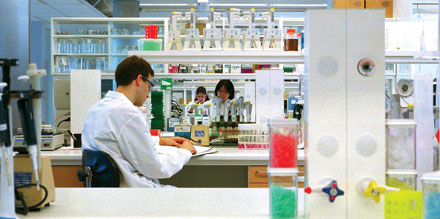How Reputation Affects Knowledge Sharing Among Colleagues
When it comes to knowledge sharing among R&D employees, professional reputations matter — but the chances of successfully garnering information from a colleague increase if the information is important.

Image courtesy of Astra Zeneca.
Social networks are a defining feature of 21st-century information exchange. Within research and development-intensive industries, in particular, social networks have always been key to fostering innovation. But what lies at the heart of a researcher’s decision to share information within a network of fellow researchers?
The Leading Question
Findings
How does reputation affect a scientist’s decision to share knowledge with a coworker?
- Assessment of a coworker’s reputation affects whether knowledge is shared.
- R&D workers, on the whole, remember knowledge exchanges; those who have taken more than given are less likely to receive information.
- Know-how that is unique and important is most likely to be shared with a coworker.
Answering this question has the potential to separate organizations with a true culture of innovation from those who are destined to be also-rans. One important factor in knowledge sharing within social networks — particularly the sharing of personal, noncodified technical knowledge that scientists and other researchers possess — is reputation. In this context, reputation is essentially one individual’s assessment of how a coworker has acted and will act after receiving assistance.
The Importance of Reputation
Reputation plays a role in interpersonal sharing of individually controlled knowledge in two ways. First, the motivations of two R&D workers may not be compatible even though they both work for the same organization. As a result, how one worker perceives the other may be the deciding
factor in a decision to offer information. Reputation also plays a role where rules or systems are unable to spur sharing. Because critical information is often held privately by individuals, workers often can choose to share or withhold such information in their interactions with colleagues without fear of sanction. That leaves reputation as a key motivator in any decision to share or withhold information.
The benefits of understanding the role of reputation in knowledge sharing stem from the fundamental tension between the importance of noncodified technological knowledge in a knowledge-intensive company and the difficulty of coordinating and controlling these private, fragmented resources. This tension is especially relevant in multidivisional, multinational businesses that depend on technology and innovation for competitive advantage.

Comment (1)
Jamie